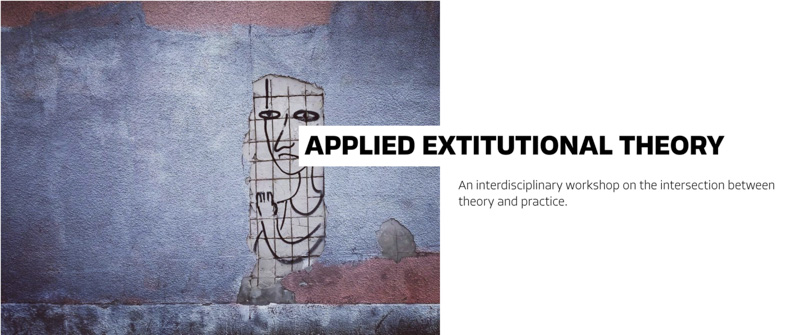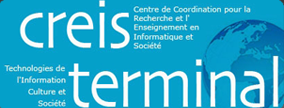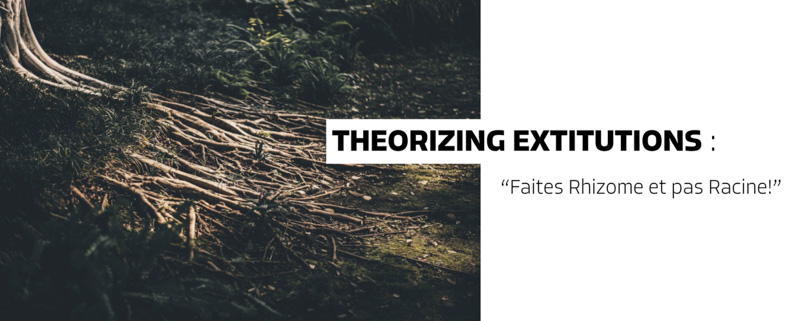Upcoming Events
There is no Event
News
 Extitutional Theory and PracticeApril 23, 2021Promoter and organiser of the seminar “Extitutional Theory and Practice” organized as part of the ERC Blockchain Gov project, in collaboration with COALA. April 19th – 23rd, 2021 (Château du Fey, France). [...]
Extitutional Theory and PracticeApril 23, 2021Promoter and organiser of the seminar “Extitutional Theory and Practice” organized as part of the ERC Blockchain Gov project, in collaboration with COALA. April 19th – 23rd, 2021 (Château du Fey, France). [...]
 Legitimacy & NFTsApril 23, 2021Promoter and organiser of the Blockchain Workshop “Legitimacy & NFTs” organized as part of the BPJRI and ERC Blockchain Gov project, in collaboration with CNAM, CNRS and COALA. April 19th – 23rd, 2021 (Château du Fey, France). [...]
Legitimacy & NFTsApril 23, 2021Promoter and organiser of the Blockchain Workshop “Legitimacy & NFTs” organized as part of the BPJRI and ERC Blockchain Gov project, in collaboration with CNAM, CNRS and COALA. April 19th – 23rd, 2021 (Château du Fey, France). [...]
Make Your Own Economy: The Tokenization of EverythingApril 13, 2021De Filippi, P., “Make Your Own Economy: The Tokenization of Everything” presentation at the Center for Innovation, Technology and Organisation (CITO) Lecture at University College Dublin. April 13th, 2021 (online). [...]
 Blockchain, Imaginaires religieux et ThéologieMarch 31, 2021Promoter and co-organiser of “Blockchain, Imaginaires religieux et Théologie”, organized by le Collège des Bernardins. March 17 & 31, 2021 (online). [...]
Blockchain, Imaginaires religieux et ThéologieMarch 31, 2021Promoter and co-organiser of “Blockchain, Imaginaires religieux et Théologie”, organized by le Collège des Bernardins. March 17 & 31, 2021 (online). [...]
 La blockchain : enjeux juridiques, économiques, de sécurité et de coûts énergétiquesMarch 26, 2021Co-organiser of a workshop on “La blockchain : enjeux juridiques, économiques, de sécurité et de coûts énergétiques” organised by CERSA and LITEM, in collaboration with CREIS-Terminal. 26 March 2021 (online). [...]
La blockchain : enjeux juridiques, économiques, de sécurité et de coûts énergétiquesMarch 26, 2021Co-organiser of a workshop on “La blockchain : enjeux juridiques, économiques, de sécurité et de coûts énergétiques” organised by CERSA and LITEM, in collaboration with CREIS-Terminal. 26 March 2021 (online). [...]
Blockchain and Legal ChallengesFebruary 26, 2021De Filippi, P., Module “Blockchain and Legal Challenges” — Master in Financial Regulation at Externado University, Colombia (8 hours), 25-26 Feb 2021. [...]
 Theorizing Extitutions : Faites Rhizome et pas Racine!February 20, 2021Promoter and organiser of the seminar “Theorizing Extitutions : Faites Rhizome et pas Racine!” organized as part of the ERC Blockchain Gov project, in collaboration with COALA. Feb 15th – 20th, 2021. (Château du Fey, France). [...]
Theorizing Extitutions : Faites Rhizome et pas Racine!February 20, 2021Promoter and organiser of the seminar “Theorizing Extitutions : Faites Rhizome et pas Racine!” organized as part of the ERC Blockchain Gov project, in collaboration with COALA. Feb 15th – 20th, 2021. (Château du Fey, France). [...]
Social Credit: The Circulation of Reputational ValueFebruary 2, 2021Reijers, W., “Social Credit: The Circulation of Reputational Value” CITO lecture at University College Dublin. 2 February 2021 (online). [...]
Sharing is Caring: Legal & Technical Frameworks for Data SharingJanuary 29, 2021De Filippi, P.: “Sharing is Caring: Legal & Technical Frameworks for Data Sharing”, presented at session on “Data Governance Act: Data protection meets competition, IP rights, and innovation” of the Computer Privacy Data Protection (CPDP) conference. 27-29 January 2021 (online). [...]
Extitutions and Institutional InnovationJanuary 27, 2021De Filippi, P.: “Extitutions and Institutional Innovation” presented at the CODEX Blockchain Law and Policy Symposium, organized by the University of Stanford. 26-27 January 2021 (online). [...]
Data as Infrastructure and Infrastructure for Data-SharingJanuary 20, 2021De Filippi, P.: “Data as Infrastructure and Infrastructure for Data-Sharing” presented at the “Data and Policy Seminar” of the Next-Generation Internet (NGI) initiative of the European Commission. 20 January 2021 (online). [...]
Blockchain Technology and Financial Regulation: A Risk-Based Approach to the Regulation of ICOsJanuary 8, 2021Collomb, A., De Filippi, P.: “Blockchain Technology and Financial Regulation: A Risk-Based Approach to the Regulation of ICOs” presented in the framework of a research lecture series on “Financial Technologies” organised by the EU-funded “FinTech Risk Management project”. 8 January 2021 (online). [...]
Blockchain as a Confidence Machine: The Problem of Trust and Challenges of GovernanceJanuary 7, 2021De Filippi, P., Mannan, M., Reijers, W.: “Blockchain as a Confidence Machine: The Problem of Trust and Challenges of Governance” presented at the seminar on “Trust & Regulatory Governance in the Age of Crisis” organised by TIGRE (Trust in governance and Regulation in Europe). 7 January 2021 (online). [...]
















 This site is licensed under a Creative Commons Attribution 4.0 International License. The BlockchainGov project has been funded by an European Research Council Grant.
This site is licensed under a Creative Commons Attribution 4.0 International License. The BlockchainGov project has been funded by an European Research Council Grant.